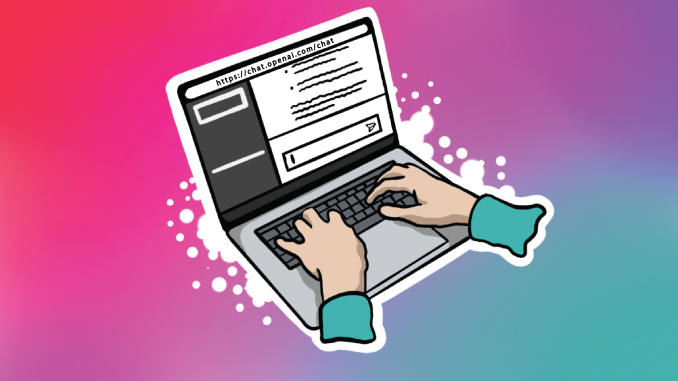
ChatGPT is a state-of-the-art conversational language model developed by OpenAI. It is based on the Generative Pre-trained Transformer architecture and has been trained on a massive amount of data to generate human-like text. ChatGPT can be used for a variety of natural language processing tasks, including answering questions, generating text, and engaging in conversation.
Although the above paragraph contains accurate information and may seem as though it was written by a writer at The Temple News, it was actually generated by asking ChatGPT, “What is ChatGPT?”
The chatbox, which uses artificial intelligence and was launched this past November, has gained traction among students and raised concern among professors about cheating on assignments.
As the future will be filled with improved AI tools, professors are being forced to consider AI’s place in the classroom.
Two students, Rachel Williams, a freshman journalism major, and Sophia Reis, a sophomore communications major, argue for and against the use of ChatGPT in academic settings:
Learning tool
Rachel Williams, freshman journalism major
ChatGPT is becoming a powerful tool for many professionals and students as it can simplify questions and research for students, increase creativity and free up time to complete other school work.
Learning experts are utilizing ChatGPT as an effective teaching tool. For example, a teacher in Oregon required students to use the site to create essay outlines for a project, The New York Times reported.
The AI industry is growing exponentially, and there are many positive aspects to the system that will allow students to see new perspectives by creating solutions that a student may not have considered themselves. It should not be viewed as a source of cheating, but as a method to help students have a personalized learning experience and a way to have more time to devote to deeper research.
“We can say with almost certainty that artificial intelligence will help both professors and students think through issues,” said David T.Z. Mindich, the chair of the journalism department.
ChatGPT can do more than just literary work; the software can help students with science, math and even composing music. The tool can also help individuals add a creative element to their life or illustrate new ideas.
“Examples anywhere from if you’re asked to write a sonnet or haiku, ChatGPT can offer some examples of that, or even write it itself,” Mindich said.
Some students may feel confused or stressed while doing homework with complex topics and some may not feel comfortable talking to their teacher or accessing tutoring resources to get extra help.
However, by implementing ChatGPT into academics, students can use it as a tutor to get help with understanding complex topics.
Having ChatGPT can help save time on intense research on assignments. Saving time won’t detract from the learning experience. Instead, it builds on the experience because students are able to devote more time to thinking deeply about the subject after ChatGPT has explained background information.
As technology improves, new advancements will become a significant aspect of the educational system. ChatGPT is a helpful tool that should be accepted, and it’s important to recognize how AI advancements will have a positive influence on academics.
“The notion of connections and idea-generating is so important and difficult and there are not a lot of tools that help you do it really well, so that’s where I think it can be really cool,” said Jordan Walsh, a second-year English graduate student.
Professors and students can use ChatGPT as a positive element in the educational experience. The next time help is needed with a school project or learning a topic, ChatGPT can be a helpful resource.
Learning inhibitor
Sophia Reis, sophomore communications major
ChatGPT has become a threat to educators, as schools in New York City, Los Angeles, and Seattle have blocked ChatGPT access to allow students to use their own thought and protect academic honesty, Forbes reported.
AI cannot — and should not — replicate human thought through written work, and ChatGBT shouldn’t become commonplace in educational settings because it inhibits students’ learning.
“If I’m teaching a writing-intensive class, and I really want students to learn about writing, having an AI or somebody else do the work for them is pretty counterproductive,” said Amy Friedman, an English professor.
Professors shouldn’t implement ChatGPT in the classroom because college is a time for students to explore their passions and engage with new material, not rely on thoughtless AI without harnessing academic skills.
“Think of yourself as an intellectual explorer, you can continue to learn and your brain has infinite capacity for adding new things,” Friedman said. “The problem with using a tool like ChatGPT is when you allow it to replace those steps.”
When professors allow students to use AI for schoolwork, it prevents them from thinking for themselves, impeding their educational experience at college.
Assignments for classes that rely on artificial intelligence don’t represent anything about the person and their knowledge, character or anything from their heart, said Amanda Morelli, a freshman event and entertainment management major.
“We were founded by humans, not artificial intelligence, and even though we have the beauty to create that, humanity is still something that we have to foster and I feel like that’s fizzling away,” Morelli said.
It’s important for professors and students to cherish authentic forms of learning inside and outside the classroom because AI has real-life and intellectual consequences, like fears of compromising a student’s ability to learn independently, solve problems creatively and think critically.
There are ethical ways for students to go about writing struggles they face that don’t involve ChatGPT. Instead of allowing their students to use AI, professors should direct students to communicate about their academic issues and access writing tutors at the Student Success Center to navigate their challenges and utilize their own thinking skills.
Although AI is becoming more widespread, professors shouldn’t work ChatGPT into their curriculum and students should have open conversations, to understand the consequences of using it to replace learning.


Be the first to comment